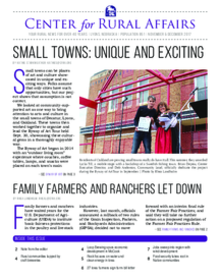Note from the editor
This edition of our newsletter focuses on PROGRESS that strengthens rural communities, small businesses, and family farms and ranches.
Our Byway of Art project demonstrates the history, arts, and culture of three rural towns. Residents of Decatur, Oakland, and Lyons embraced community-driven art and now have projects for future generations to enjoy.
We learn about the craft brewing and wind energy industries that are providing jobs, resulting in tax income, and boosting rural economies.
In our executive director’s essay, Brian talks about the community food work we have done alongside two Native American tribes, and the progress that has been made in helping them establish nearly 300 gardens this year. These residents are realizing they can be in control of their food systems.
We hear from 27 farmers who live in Iowa. They are taking a step forward and writing their lawmakers about the future of our soil and water. They understand progress has been made in the last farm bill and ask Congress to protect conservation programs.
Lastly, we hear about the government’s lack of progress to institute basic fairness protections in the poultry and livestock industries. Last month, rules that would protect family farmers and ranchers were rolled back and shut down. We urge lawmakers to reconsider. Progress can be made in rural communities.
Inside this issue
Small towns: unique and exciting – Small towns can be places of art and culture showcased in unique and exciting ways. Folks assume that only cities have such opportunities, but our project shows that assumption is not correct.
Family farmers and ranchers let down – Family farmers and ranchers have waited years for the U.S. Department of Agriculture (USDA) to institute basic fairness protections in the poultry and livestock industries. However, last month, officials announced a rollback of two rules of the Grain Inspection, Packers, and Stockyards Administration (GIPSA); decided not to move forward with an interim final rule of the Farmer Fair Practices; and said they will take no further action on a proposed regulation of the Farmer Fair Practices Rule.
From the desk of the executive director: Food security takes root in native communities – Six years ago, three members of our staff started meeting with representatives of the Santee Sioux Nation in Northeast Nebraska. The conversation centered on building food security for tribal members.
Rural communities tapped by craft breweries – Brewing beer is big business in the U.S. In 2016, this centuries-old practice generated $64 million in annual tax revenue and accounted for nearly 2 percent of Gross Domestic Product. Today, the beer industry employs more than 64,000 individuals nationwide.
Loop Brewing spurs economic development in McCook – Loop Brewing Company in McCook, Nebraska, is another craft brewery that has spurred economic development in its city.
Staff spotlight: Rock focuses on water and clean energy in Iowa – Katie Rock recently joined the Center for Rural Affairs, where her focus will be on water and clean energy issues in Iowa. She is based in our Nevada, Iowa, office.
27 Iowa farmers sign farm bill letter – As farmers in Iowa, we write to you with concerns about the future of conservation in our state. Conservation practices, such as planting cover crops, have been enormously beneficial for our operations.
Jobs sweep into region with wind development – Wind energy continues to grow in the U.S., especially in the heart of the country. With some of the best renewable resources available, this region has significant potential to generate clean energy while also reaping the benefits of development.


